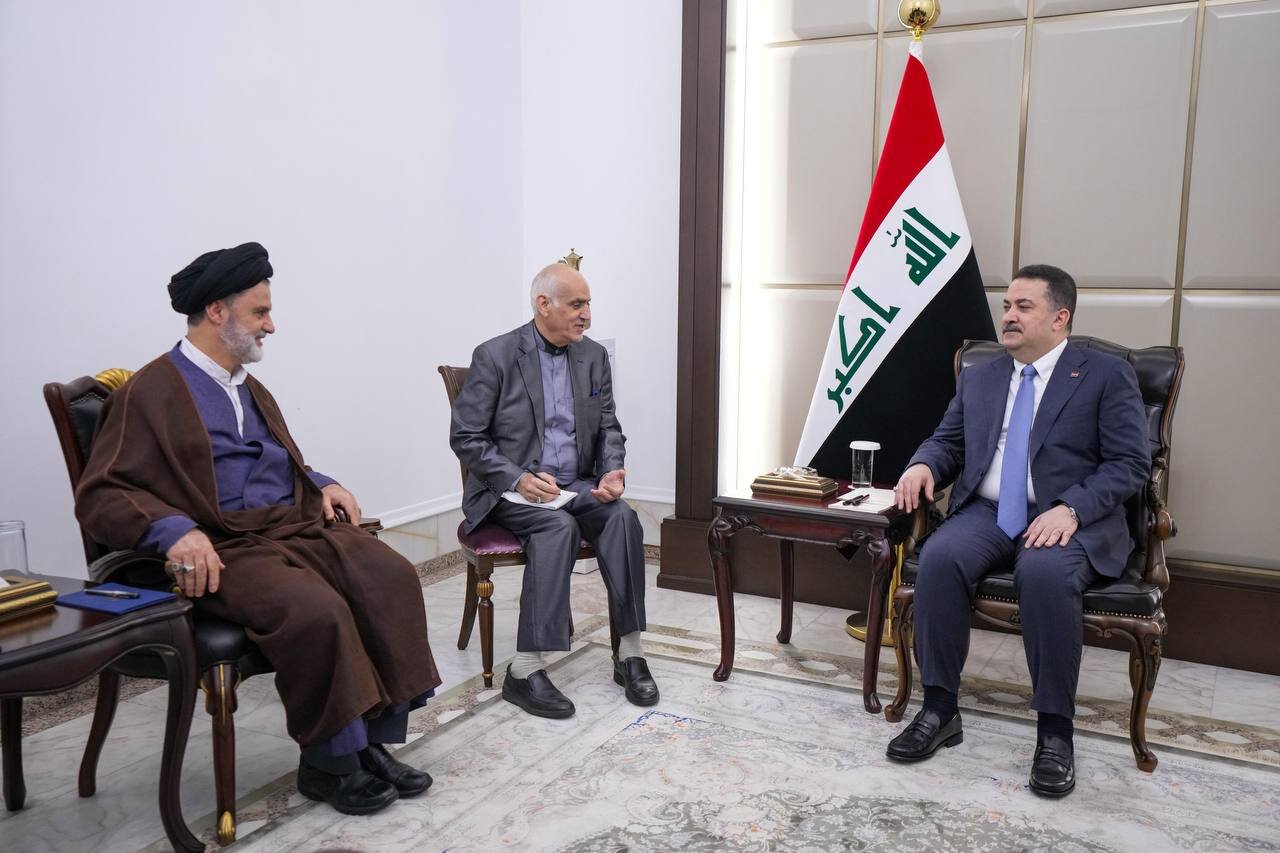‘Iraq stands with Iran:’ Sudani receives Iranian delegation, vows UN action against Israel

TEHRAN – Iraqi Prime Minister Mohammed Shia al-Sudani received Mahmoud Nabavian, First Deputy Chairman of Iran’s National Security and Foreign Policy Committee, and his accompanying delegation on Monday.
The meeting focused on regional security dynamics, recent developments, and the Israeli regime’s aggression against Iran.
Al-Sudani emphasized Baghdad’s "firm and consistent stance in rejecting aggression," revealing Iraq had submitted a formal complaint to the United Nations condemning the attacks.
He further outlined Iraq’s diplomatic efforts, stating the country “will continue active communication with world leaders and international powers to support regional stability and prevent the escalation of conflict.”
In response, Nabavian conveyed greetings from Iranian President Masoud Pezeshkian and Parliament Speaker Mohammad Baqer Qalibaf, expressing Tehran’s gratitude for "the stance of the Iraqi government and its highest religious authority in condemning the aggression."
Nabavian stressed the critical need for "coordinated positions to ensure regional stability and achieve the aspirations of Arab and Muslim nations for sustainable development."
The high-level engagement builds upon sustained diplomatic momentum between the neighbors. This visit follows Iranian President Masoud Pezeshkian’s significant trip to Baghdad in September 2024, his first international visit as president, where both nations signed memoranda of understanding spanning economics, trade, agriculture, services, communications, and religious tourism, aiming to "drive development and open broader avenues for partnership."
Earlier this year, Iraqi Parliament Speaker Mahmoud al-Mashhadani traveled to Tehran, where both sides "reaffirmed the depth of ties" during meetings with President Pezeshkian and other officials.
Security coordination
The parliamentary delegation, which also includes committee spokesperson Ebrahim Rezaei and member Ali Khezrian, arrived in Baghdad on Saturday. Their visit began symbolically at the memorial for Resistance martyrs Major General Qassem Soleimani and Abu Mahdi al-Muhandis, where verses from the Quran were recited in honor of the commanders pivotal to defeating U.S.-backed terrorism in the region.
The talks occur against the backdrop of U.S.-Israeli aggression. During a 12-day war initiated by the Israeli regime, the U.S. launched a major strike on Iran’s civilian nuclear facilities on June 22. This operation reportedly involved B-2 Spirit stealth bombers dropping fourteen GBU-57A/B Massive Ordnance Penetrator bombs on the Fordow and Natanz nuclear sites, alongside Tomahawk cruise missiles launched from an Ohio-class submarine against the Isfahan nuclear technology center.
Reports suggest elements of the strike package transited Iraqi airspace, with U.S. forces in Iraq providing logistical and intelligence support. Salem Al-Mohammadawi, head of Iraq’s Security and Defense Committee, who greeted the Iranian delegation upon arrival, reiterated that any such activities by foreign forces in Iraq are "illegal," noting that "orders had been issued to curb such operations."
The war resulted in over 1,062 Iranian martyrs, including senior military commanders, nuclear scientists, and hundreds of civilians.
Arbaeen: A pillar of unity and cooperation
Strategic talks also encompassed cultural and religious cooperation. The Iranian delegation met with Ammar al-Hakim, leader of Iraq’s National Wisdom Movement.
Hakim emphasized leveraging the vast Arbaeen pilgrimage – the world's largest annual religious gathering commemorating the 40th day after the martyrdom of Imam Hussein (AS) – to "strengthen official and popular cooperation between Iraq and the Islamic Republic of Iran", recognizing its "pivotal role" in deepening bilateral ties.
He further called for "strengthening parliamentary cooperation" through joint committees and exchanging expertise.
This focus on Arbaeen underscores its significance as a "major model of the policy of neighborliness" and a catalyst for unprecedented logistical and security coordination.
Only last week, Interior Ministers of Iran, Iraq, and Pakistan convened in Tehran for a trilateral summit finalizing security and logistical arrangements for the upcoming pilgrimage.
Iranian Interior Minister Eskandar Momeni declared the cooperation had reached a "strategic level," linking pilgrim safety directly to regional stability and praising Iraqi and Pakistani solidarity following the Israeli attacks .
Iraqi Interior Minister Abdul Amir al-Shammari confirmed readiness under al-Sudani’s directives, stating "service and logistical facilities are fully prepared" to welcome millions, recalling over 5 million foreign pilgrims attended in 2024, including 3 million Iranians.
The immense scale of Arbaeen – attracting tens of millions – necessitates deep cross-border collaboration on security, transportation, and hospitality infrastructure, transforming it into both a profound spiritual event and a critical platform for institutionalized regional partnership.
Leave a Comment